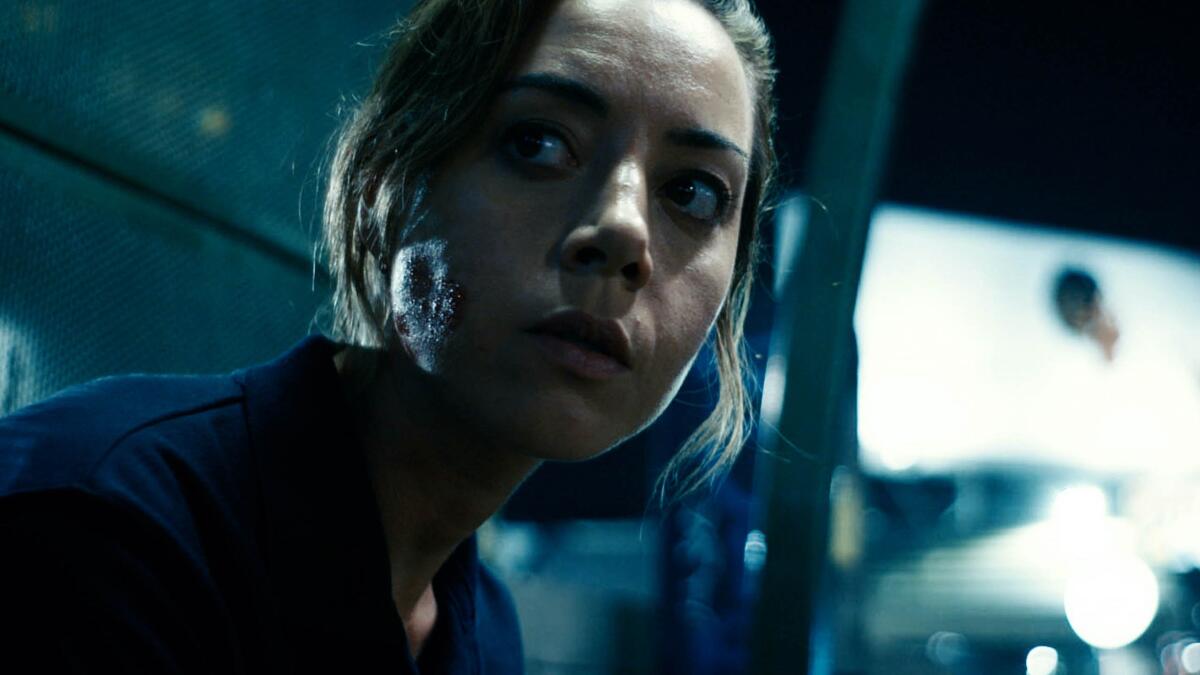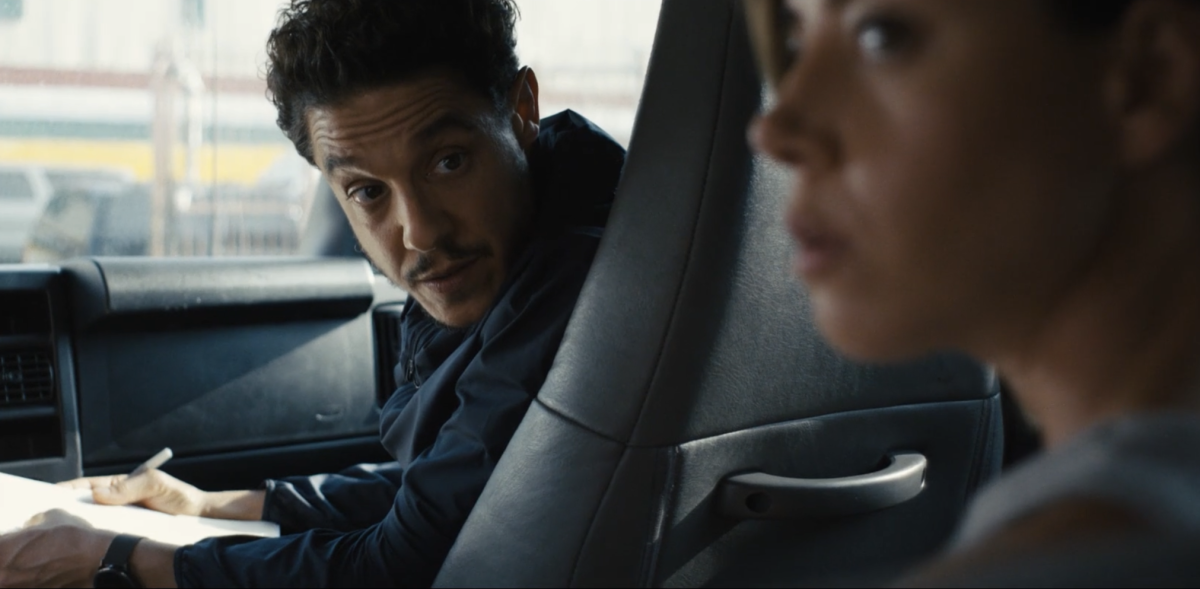Aubrey Plaza kills it in ‘Emily the Criminal’

- Share via
Aubrey Plaza knows a thing or two about stealing. With her laserlike glare and killer deadpan timing, she can say absolutely nothing and slyly pocket a scene. Given the right setup, her characters can push memorably against the boundaries of acceptable behavior, mixing absurdity and menace in often dangerously unstable proportions. It’s what made her such a sympathetic stalker in “Ingrid Goes West” and such a riotous naughty nun in “The Little Hours.” She pulled off maybe her stealthiest act of cinematic larceny in “Happiest Season,” a cheerful holiday rom-com in which Plaza, a supporting player, nonetheless positioned herself as a plausible, even preferable, romantic ideal.
Plaza doesn’t have to steal scenes in “Emily the Criminal.” She plays the title role, and nearly every moment — starting with the one where Emily storms out (not for the last time) of a degrading job interview — rightly belongs to her. Written and directed by the first-time feature filmmaker John Patton Ford, the movie is both an engrossing thriller and a pointed takedown of predatory capitalism, with a protagonist who straddles a hellish Venn diagram of student loan debts, exploitative labor practices and sheer rotten luck. Emily has a hell of a sob story, though her natural discretion and refusal of self-pity keep it from sounding like one. She also has an aggravated-assault conviction on her record, which makes it nearly impossible for her to find steady work, let alone pay off the $70,000 she owes for an unfinished art degree.
For your safety
The Times is committed to reviewing theatrical film releases during the COVID-19 pandemic. Because moviegoing carries risks during this time, we remind readers to follow health and safety guidelines as outlined by the CDC and local health officials.
Ford doesn’t reveal the circumstances behind that assault conviction right away, and apart from a few details — Emily hails from New Jersey and has the accent to prove it — he keeps her background fairly vague. He wants to hold us at a partial remove from Emily, to suggest something of her capacity for violence while keeping us firmly on her side. Not that it’s hard to empathize: Whatever happened in the past, she’s putting forth a good-faith effort to get her act together in the present. She shares a cramped L.A. apartment with two roommates and just about gets by making food deliveries, an independent-contractor gig with predictably lousy wages, no benefits and inflexible hours. A jet-setting college friend (Megalyn Echikunwoke) is forever promising to help Emily get her foot in the door at an upscale ad agency, dangling a beautiful future they both know will never arrive.
It’s one of Emily’s co-workers (Bernardo Badillo) who slips her an actual opportunity, albeit an illegal one. A smooth operator named Youcef (a very good Theo Rossi) lays out the rules: As a “dummy shopper,” Emily will go to a big-box store and purchase some electronic equipment using a phony credit card, then slip out before the theft is discovered. The merchandise will be picked up and resold, and she’ll be paid $200 — not bad for an hour’s work. And Emily, to her surprise, anxiety and excitement, turns out to be very good at this kind of work, partly because few people suspect her of doing it. One of the movie’s more honest if tacit points is how a white woman might get the benefit of the doubt — and even get ahead — in ways that Emily’s fellow dummy shoppers, some of them Black and Latino men, clearly do not.

But whatever Emily may represent sociologically, she is first and foremost a figure of sustained and highly specific dramatic interest. One of the pleasures of Plaza’s performance is the way she shows us a person working out her fight-or-flight instincts in real time, and in ever more dangerous transactional situations. We see Emily’s caution and recklessness duke it out when she’s confronted by a suspicious car dealer or, in an especially harrowing episode, a knife-wielding robber. We also savor her growing satisfaction when, with Youcef’s help, she launches her own racket, printing the credit cards, picking up the merchandise and arranging the resales herself. All this takes place on an array of almost palpably unlovely Los Angeles locations, filmed here with a restless run-and-gun immediacy. (Ford’s skilled collaborators include Jeff Bierman, who handled the movie’s handheld cinematography, and Nathan Halpern, who composed the steadily pulsing score.)
It falls to Youcef, a Lebanese immigrant with his own hard-luck backstory, to give this modern-day noir its requisite whisper of romantic fatalism. Given the initially combative, increasingly sexy sparks that fly between him and Emily, this development is both unsurprising and far from unwelcome. Still, as Emily and Youcef’s business arrangement becomes mired in emotional complications, Ford’s plotting loses some of its earlier tautness; the closing stretch turns looser and more ragged even as it pushes both characters to new levels of desperation. But if the movie doesn’t entirely work as a genre exercise, it’s on more assured footing as a portrait of a woman who’s learned to operate in a permanent survival mode.
It’s telling that even when her credit-card fraud operation starts taking off, Emily knows better than to coast, or to neglect her other sources of income. She keeps making her food deliveries and keeps hustling for that big-break interview, which allows Ford to tuck in a few side points about the injustices of the gig economy and — in a scene likely to inspire head nods — of full-time unpaid internships. It isn’t hard work that bothers Emily; it’s how little she and (by extension) millions of Americans get in return for their hard work, thanks to social forces more cruelly, immorally exploitative than any one individual’s unlawful activities. This may be the story of Emily the criminal, but Ford reserves his harshest indictment for the system that created her.
‘Emily the Criminal’
Rating: R, for language, some violence and brief drug use
Running time: 1 hour, 35 minutes
Playing: Starts Aug. 12 in general release
More to Read
Only good movies
Get the Indie Focus newsletter, Mark Olsen's weekly guide to the world of cinema.
You may occasionally receive promotional content from the Los Angeles Times.











